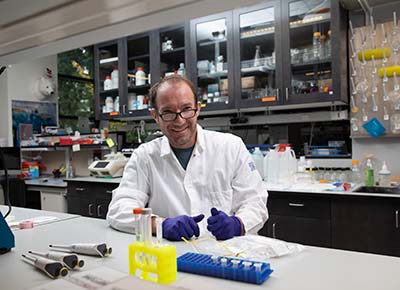Campus News
Ed Green named QB3-Santa Cruz Scientific Director
Richard (Ed) Green, professor of biomolecular engineering, has been selected to serve as the next director of the California Institute of Quantitative Biosciences (QB3) at UC Santa Cruz.

Richard (Ed) Green, professor of biomolecular engineering, has been selected to serve as the next director of the California Institute of Quantitative Biosciences (QB3) at UC Santa Cruz.
QB3 is the University of California’s hub for innovation and entrepreneurship in life science, working with UC researchers and other scientists to launch startup companies and partner with industry. QB3 has centers at UC Santa Cruz, Berkeley, and San Francisco and operates in collaboration with private industry and venture capital.
“The opportunities in biotechnology are enormous,” Green said. “QB3 has been at the forefront, fostering the connections that aim UCSC technology at important problems. I’m looking forward to expanding the impact of QB3 in Santa Cruz and beyond.”
Green is an expert in paleogenomics and forensic genomics. His research has led to breakthrough discoveries about human evolution, such as the mixing between the earliest modern humans and Neanderthals. He is the co-principal investigator of the UCSC Paleogenomics Lab, a collaborative venture with Professor of Ecology and Evolutionary Biology Beth Shapiro that uses ancient DNA to investigate mysteries in genome and species evolution.
He is the co-founder and scientific advisor of Astrea Forensics, which takes on difficult-to-solve forensic casework and the identification of human remains through the application of ancient DNA techniques and direct genome sequencing. Green pioneered a technique that can sequence DNA from rootless hair, a previously impossible feat that has ultimately led to the solving of many cold cases and closure for the families of victims.
Green has founded two startup companies through QB3 at UCSC. Dovetail Genomics, which began as a startup on the UCSC campus and later moved to Scotts Valley, uses specialized methods for various complex genomics projects and is now part of Cantata Bio. Claret Biosciences builds next-generation sequencing library preparation and analysis tools that empower a deeper understanding of degraded DNA molecules, particularly cancer-derived molecules.
Green earned a B.S. in genetics at the University of Georgia, Athens, and a Ph.D. in molecular and cell biology, with an emphasis in computational and genomic biology, at UC Berkeley. He joined the faculty of the Baskin School of Engineering at UC Santa Cruz in January 2010 and is also affiliated with the departments of anthropology and molecular, cell, and developmental biology.
Green will succeed Distinguished Professor of Biomolecular Engineering David Haussler, who has served in the position since QB3 was established in 2000.